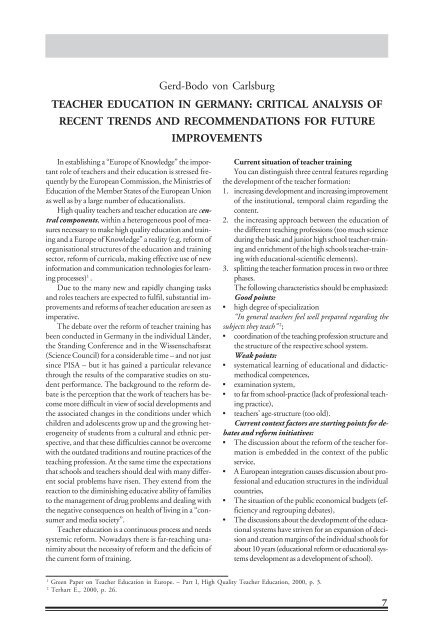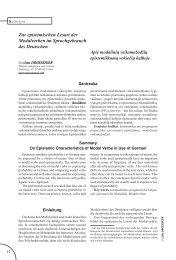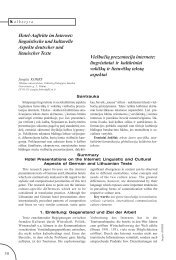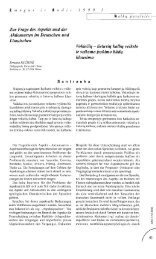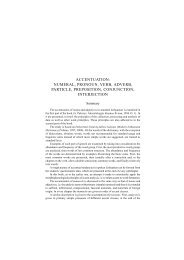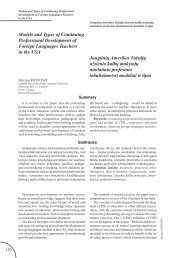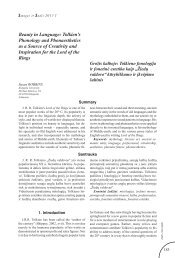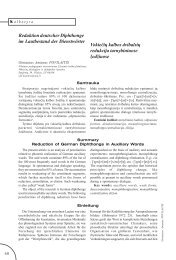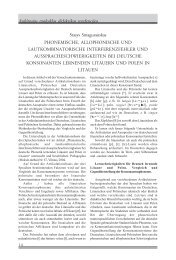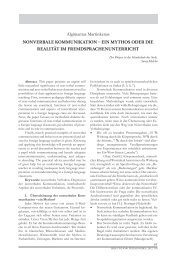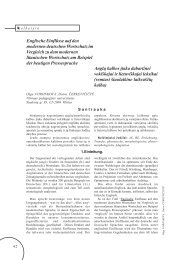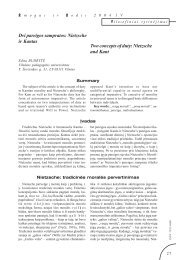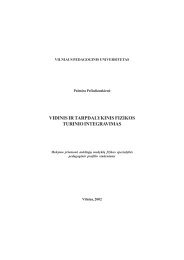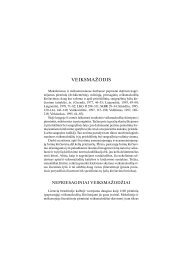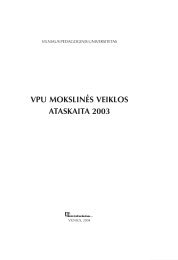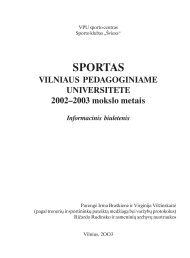Gerd-Bodo von Carlsburg TEACHER EDUCATION ... - VPU biblioteka
Gerd-Bodo von Carlsburg TEACHER EDUCATION ... - VPU biblioteka
Gerd-Bodo von Carlsburg TEACHER EDUCATION ... - VPU biblioteka
You also want an ePaper? Increase the reach of your titles
YUMPU automatically turns print PDFs into web optimized ePapers that Google loves.
<strong>Gerd</strong>-<strong>Bodo</strong> <strong>von</strong> <strong>Carlsburg</strong><br />
<strong>TEACHER</strong> <strong>EDUCATION</strong> IN GERMANY: CRITICAL ANALYSIS OF<br />
RECENT TRENDS AND RECOMMENDATIONS FOR FUTURE<br />
IMPROVEMENTS<br />
In establishing a “Europe of Knowledge” the important<br />
role of teachers and their education is stressed frequently<br />
by the European Commission, the Ministries of<br />
Education of the Member States of the European Union<br />
as well as by a large number of educationalists.<br />
High quality teachers and teacher education are central<br />
components, within a heterogeneous pool of measures<br />
necessary to make high quality education and training<br />
and a Europe of Knowledge” a reality (e.g. reform of<br />
organisational structures of the education and training<br />
sector, reform of curricula, making effective use of new<br />
information and communication technologies for learning<br />
processes) 1 .<br />
Due to the many new and rapidly changing tasks<br />
and roles teachers are expected to fulfil, substantial improvements<br />
and reforms of teacher education are seen as<br />
imperative.<br />
The debate over the reform of teacher training has<br />
been conducted in Germany in the individual Länder,<br />
the Standing Conference and in the Wissenschaftsrat<br />
(Science Council) for a considerable time – and not just<br />
since PISA – but it has gained a particular relevance<br />
through the results of the comparative studies on student<br />
performance. The background to the reform debate<br />
is the perception that the work of teachers has become<br />
more difficult in view of social developments and<br />
the associated changes in the conditions under which<br />
children and adolescents grow up and the growing heterogeneity<br />
of students from a cultural and ethnic perspective,<br />
and that these difficulties cannot be overcome<br />
with the outdated traditions and routine practices of the<br />
teaching profession. At the same time the expectations<br />
that schools and teachers should deal with many different<br />
social problems have risen. They extend from the<br />
reaction to the diminishing educative ability of families<br />
to the management of drug problems and dealing with<br />
the negative consequences on health of living in a “consumer<br />
and media society”.<br />
Teacher education is a continuous process and needs<br />
systemic reform. Nowadays there is far-reaching unanimity<br />
about the necessity of reform and the deficits of<br />
the current form of training.<br />
Current situation of teacher training<br />
You can distinguish three central features regarding<br />
the development of the teacher formation:<br />
1. increasing development and increasing improvement<br />
of the institutional, temporal claim regarding the<br />
content.<br />
2. the increasing approach between the education of<br />
the different teaching professions (too much science<br />
during the basic and junior high school teacher-training<br />
and enrichment of the high schools teacher-training<br />
with educational-scientific elements).<br />
3. splitting the teacher formation process in two or three<br />
phases.<br />
The following characteristics should be emphasized:<br />
Good points:<br />
• high degree of specialization<br />
“In general teachers feel well prepared regarding the<br />
subjects they teach” 2 ;<br />
• coordination of the teaching profession structure and<br />
the structure of the respective school system.<br />
Weak points:<br />
• systematical learning of educational and didacticmethodical<br />
competences,<br />
• examination system,<br />
• to far from school-practice (lack of professional teaching<br />
practice),<br />
• teachers’ age-structure (too old).<br />
Current context factors are starting points for debates<br />
and reform initiatives:<br />
• The discussion about the reform of the teacher formation<br />
is embedded in the context of the public<br />
service,<br />
• A European integration causes discussion about professional<br />
and education structures in the individual<br />
countries,<br />
• The situation of the public economical budgets (efficiency<br />
and regrouping debates),<br />
• The discussions about the development of the educational<br />
systems have striven for an expansion of decision<br />
and creation margins of the individual schools for<br />
about 10 years (educational reform or educational systems<br />
development as a development of school).<br />
1 Green Paper on Teacher Education in Europe. – Part I, High Quality Teacher Education, 2000, p. 3.<br />
2 Terhart E., 2000, p. 26.<br />
7
<strong>Gerd</strong>-<strong>Bodo</strong> <strong>von</strong> <strong>Carlsburg</strong><br />
8<br />
administration<br />
of school<br />
€<br />
€<br />
PROBLEMS IN THE GERMAN SYSTEM OF<br />
<strong>TEACHER</strong> <strong>EDUCATION</strong><br />
during the different phases<br />
FIRST STEP / PHASE<br />
• There’s no systematic relationship between the single<br />
parts of the studies: school practical training, studies<br />
of education, studies in the special branches (scientific<br />
studies). The studies in the didactic of special<br />
branches are not enough coordinated.<br />
• The educational studies have a subordinate position.<br />
(Educational sciences, Psychology, Sociology...).<br />
• The school practical trainings are not coordinated<br />
and linked with the other parts of studies.<br />
• The first examination is rather a test of the short<br />
time memory.<br />
€<br />
Figure 1: Order of development<br />
Figure 2: Basic teacher competencies<br />
€<br />
€teacher<br />
SECOND STEP / PHASE<br />
• There’s no coordination between the first und second<br />
phase (no systematic junction).<br />
• It’s difficult for to be a counsellor and a judge at the<br />
same time (double-function).<br />
• The certificates are very important; the marks support<br />
the competition and rivalry among the novices<br />
/ junior teachers.<br />
• Another problem is the dependency on the seminary<br />
instructors (pressure of accommodation).<br />
• It’s difficult to recruit and qualify seminary instructors.<br />
That’s why they often are not enough qualified<br />
persons.<br />
• There can be problems in coordinating the seminary<br />
and school activities.
THIRD STEP / PHASE<br />
Finally, the different approaches to reform have in<br />
common an understanding of teacher training as a development<br />
process which continues beyond the study<br />
course and stage of practical teaching work and which<br />
must be systematically supported there (“professional<br />
biography approach”).<br />
WORKING OUT PLANS<br />
OF ADVANCED<br />
<strong>EDUCATION</strong> AT<br />
SINGULAR SCHOOLS<br />
AS PART OF THE INNER<br />
SCHOOL-REFORM.<br />
QUALIFICATION AND<br />
SELECTION OF<br />
INSTRUCTORS<br />
MAIN CURRICULAR FOR THE<br />
STUDIES OF <strong>EDUCATION</strong><br />
RECOMMENDATIONS<br />
OF THE MIXED<br />
COMMISSION OF<br />
<strong>TEACHER</strong> <strong>EDUCATION</strong><br />
IMPLEMENTATION OF<br />
INCENTIVES,<br />
(CLOSER RELATIONSHIP<br />
BETWEEN PROFESSIONAL<br />
PERFORMANCE AND<br />
CAREER)<br />
THE PROCESS<br />
OF LEARNING IN THE JOB<br />
BETTER COORDINATION<br />
OF THE FIRST AND SECOND<br />
PHASE OF <strong>EDUCATION</strong>;<br />
TEMPORARY EXCHANGE<br />
OF INSTRUCTORS OF THE<br />
FIRST AND SECOND PHASE<br />
SECOND PHASE OF <strong>TEACHER</strong>S <strong>EDUCATION</strong><br />
REINFORCEMENT OF THE<br />
DIFFERENT DIDACTICS<br />
(DIFFERENT DIDACTICS AS<br />
BRIDGES BETWEEN<br />
SCIENTIFIC AND<br />
PEDAGOGICAL TRAINING)<br />
Teacher Education in Germany<br />
• This step is often neglected. (ðnot enough care for<br />
the further development of teachers).<br />
• There’s no direct connection between the professional<br />
performance and career and.<br />
• There’s no systematic support of the continuous<br />
learning und the development of professionalism.<br />
FIRST UNIVERSITARY PHASE OF <strong>TEACHER</strong>S <strong>EDUCATION</strong> -<br />
STUDIES OF <strong>EDUCATION</strong><br />
IMPLEMENTATION OF A<br />
SYSTEM OF SUPPORT FOR<br />
YOUNG <strong>TEACHER</strong>S IN THE<br />
FIRST YEARS OF<br />
PROFESSION, CONTINUOUS<br />
DEVE-LOPMENT OF<br />
PROFESSIO-NAL SKILLS<br />
Figure 3: Recommendations of the Mixed Commission of Teacher Education<br />
HIGH LEVEL OF SELF-<br />
ORGANISATION BY<br />
PROFESSIONAL LEARING<br />
FOR <strong>TEACHER</strong>S ASPIRANTS<br />
IMPLEMENTATION OF<br />
CENTRES OF <strong>TEACHER</strong>S<br />
<strong>EDUCATION</strong> AND SCHOOL<br />
RESEARCH<br />
9
<strong>Gerd</strong>-<strong>Bodo</strong> <strong>von</strong> <strong>Carlsburg</strong><br />
STUDIUM: UNIVERSITY / UNIVERSITY OF<br />
<strong>EDUCATION</strong><br />
FIRST STEP / PHASE<br />
• scientific foundation at university (University of<br />
Education),<br />
• two branches and studies of education,<br />
• reflexion of the profession,<br />
• first examination: 1. Lehramtsprüfung.<br />
10<br />
FIRST STEP /<br />
PHASE<br />
SECOND STEP /<br />
PHASE<br />
SEMINARIES: SCHOOL FOR THE <strong>EDUCATION</strong><br />
OF PRACTICE AND <strong>TEACHER</strong>S SEMINAR<br />
SECOND STEP / PHASE<br />
• development of professional practical skills at teachers<br />
seminar (Studienseminar),<br />
• development of first professional routines,<br />
• second examination: 2. Lehramtsprüfung (necessary<br />
to be allowed to work as a teacher in public schools).<br />
STUDYING IN THE PROFESSION OR IN-SER-<br />
VICE LEARNING: PHASE OF ENTRY INTO THE<br />
PROFESSION AND FURTHER TRAINING<br />
THIRD STEP / PHASE<br />
• advanced training of teachers (further education, lifelong<br />
education)<br />
PHASES OF <strong>TEACHER</strong>S <strong>EDUCATION</strong> IN GERMANY<br />
Figure 4: Phases of Teacher Education in Germany<br />
THIRD STEP /<br />
PHASE<br />
CENTRAL ELEMENTS IN A CURRICULUM OF <strong>EDUCATION</strong>AL STUDIES<br />
cooperation at school<br />
relationship between<br />
teacher and pupil<br />
giving support<br />
to pupils<br />
evocation<br />
and support<br />
of social behavior<br />
getting along with problems of<br />
discipline and special risks of pupils<br />
school and publicity creation different<br />
settings for learning<br />
evaluation<br />
knowledge of<br />
strategies of learning<br />
and supporting the<br />
process of learning<br />
using new medias<br />
and technologies<br />
at school<br />
teachers’ competence<br />
of self-organisation<br />
Figure 5: Central elements in a main curriculum of educational studies<br />
The growing importance of lifelong learning<br />
• continuous creative working within and outside<br />
the profession indicates life<br />
• continuous learning contributes to the individual-<br />
biographic development of the human being<br />
• changes and the acceleration of processes may overtax<br />
people and can bring up losers and objectors of<br />
a modernization
THE RELATION BETWEEN THEORY AND PRACTICE<br />
IN <strong>TEACHER</strong> FORMATION<br />
‘PRACTICE’ IN THE FIRST PHASE<br />
• Construction of practice knowledge by observation,<br />
studying in teaching and research projects<br />
• Identification of problem situations at schools<br />
• Collection of practical experiences in cooperative<br />
studying forms<br />
• Collection of didactic experience<br />
Aim:<br />
• The ability to reflect theoretical positions regarding<br />
the experienced practice<br />
• Points of view which are based on science and didactic<br />
‘PRACTICE’ IN THE SECOND PHASE – responsible<br />
work in the classroom<br />
• It should contribute to the construction of concrete<br />
professional competences, attitudes and routines.<br />
Creating a new studying / lifelong learning culture<br />
• Differentiated studying / learning offers<br />
• Application of more new teaching-studying forms<br />
• New organization form of the studying / learning<br />
substance<br />
• Stronger and better arrangement of practice knowledge<br />
• Application orientation<br />
• Individual support (distinction in the width and<br />
size of the studying / lifelong learning substance)<br />
• Optimal support of both efficient and inefficient<br />
pupils<br />
• Development of various activities / including skilled<br />
crafts / languages....<br />
Learning objectives should be<br />
• Self organization<br />
• Self-responsibility<br />
• Self evaluation<br />
Better organization of ‘all-day schools’<br />
• With additional specialized staff<br />
• To encourage creativity / practical and social work<br />
• For the individual demand and avoidance of a social<br />
discrimination<br />
Improvement of resource equipment<br />
• Improvement of the material and personal equipment<br />
• Support of the schools by experts (e.g. therapists,<br />
psychologists, diet scientists etc.)<br />
• Good spatial, computer and technical equipment,<br />
school library<br />
• A new financing system should lead to greatest possible<br />
flexibility and efficiency in the use of the resources<br />
CENTRAL ASPECTS<br />
Teacher Education in Germany<br />
• It is an on experience-based study in the professional<br />
field.<br />
Task of the seminar:<br />
Accompanying, supporting and steering of the professional<br />
processes of learning and personal development<br />
Aim:<br />
Construction of professional action competence and<br />
first routines<br />
(can be done responsibly only through re-connecting<br />
to the theory)<br />
‘PRACTICE’ IN THE THIRD PHASE<br />
• Acquisition of experience knowledge and action securities<br />
in the first working years<br />
• Continuous lifelong education<br />
Safeguarding of the quality of lifelong education<br />
• Stronger autonomy of schools<br />
• Application of modern management concepts<br />
• Introduction of obligatory aim agreements between<br />
teachers and school head-masters and giving of accounts<br />
• Consequences have to be pulled from the evaluations<br />
which were carried out and the transfer research<br />
has to be improvement.<br />
Conclusion<br />
Investing into teacher education must be viewed<br />
as most effective to increase student achievement compared<br />
with other political measures to improve effectiveness<br />
of teaching.<br />
Making teacher education as an open and dynamic<br />
system a reality, will sometimes involve the breaking down<br />
of old concepts of teacher education and the teaching<br />
profession.<br />
In principle, widespread teacher education has to be<br />
conceived as an open and dynamic system and as a continuous<br />
process consisting of the closely interrelated components:<br />
• initial teacher education,<br />
• induction into the professional cultures of schools,<br />
• in-service teacher education and/or continuous professional<br />
development,<br />
• further education for teachers,<br />
• school development and improvement and,<br />
• research.<br />
11
<strong>Gerd</strong>-<strong>Bodo</strong> <strong>von</strong> <strong>Carlsburg</strong><br />
The Green Paper on the “European Dimension in<br />
Education” (European Commission) made explicit reference<br />
to the important role of teachers and teacher education<br />
in making this dimension a reality. Compared to<br />
the situation in the late eighties only incremental progress<br />
has been made in this respect. More coherent and substantial<br />
efforts especially in teacher education seem to be<br />
necessary if the European Dimension in Education is to<br />
be developed further.<br />
Investavimas á mokytojø rengimà, lyginant su kitomis<br />
politinëmis priemonëmis, yra efektyviausia priemonë<br />
didinant studentø paþangumà, gerinant mokymo<br />
efektyvumà.<br />
Kad mokytojø rengimas kaip atvira ir dinamiðka sistema<br />
taptø realybe, reikëtø atsisakyti pasenusiø mokytojø<br />
rengimo bei mokytojo profesijos nuostatø.<br />
Mokytojø rengimas turëtø bûti suvokiamas kaip atvira<br />
ir dinamiðka sistema bei nuolatinis procesas, susidedantis<br />
ið glaudþiai susijusiø komponentø: pradinio mokytojø<br />
rengimo, supaþindinimo su mokyklø profesinë-<br />
12<br />
Santrauka<br />
<strong>Gerd</strong>-<strong>Bodo</strong> <strong>von</strong> <strong>Carlsburg</strong><br />
References<br />
1. Buchberger F., Campos B. P., Kallos J., Stephenson<br />
D. Green Paper on Teacher Education in Europe<br />
// Thematic Network on Teacher Education in<br />
Europe. – High Quality Teacher Education for<br />
High Quality Education and Training, 2000.<br />
2. Perspektiven der Lehrerbildung in Deutschland /<br />
Hrsg. E. Terhart. – Weinheim / Basel, 2000.<br />
3. Terhart E. Lehrerberuf und Lehrerbildung.<br />
Forschungsbefunde, Problemanalysen,<br />
Reformkonzepte. – Beltz Verlag. Weinheim /<br />
Basel, 2001, S. 207, Cf. also the report commissioned<br />
by the Conference of Education Ministers<br />
”Perspektiven der Lehrerbildung in Deutschland”.<br />
MOKYTOJØ RENGIMAS VOKIETIJOJE: DABARTINIØ TENDENCIJØ KRITINË<br />
ANALIZË IR REKOMENDACIJOS TOBULINIMO PERSPEKTYVAI<br />
mis kultûromis, mokytojø kvalifikacijos këlimo ir /arba<br />
nuolatinio profesinio tobulinimosi, mokyklos plëtros ir<br />
tobulinimo, mokslinio tiriamojo darbo.<br />
„Europos dimensijos ðvietime“ (Europos Komisija)<br />
Þalioji korta atvirai konstatavo svarbø mokytojø bei jø<br />
rengimo vaidmená paversdama ðià dimensijà realybe.<br />
Lyginant su 1980 m. situacija, ðioje srityje padaryta<br />
tik labai neþymi paþanga. Kad Europos dimensija ðvietime<br />
bûtø vykdoma toliau, bûtina ádëti daugiau pastangø<br />
rengiant mokytojus.<br />
Heidelbergo pedagoginis universitetas<br />
Áteikta 2006 m. liepos mën.


